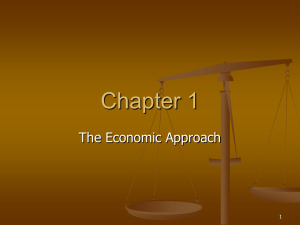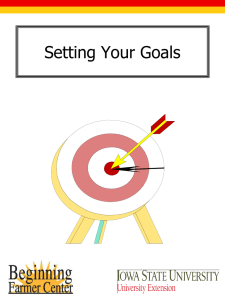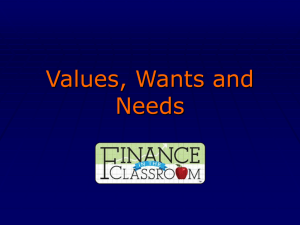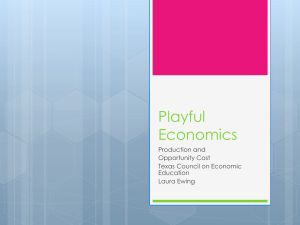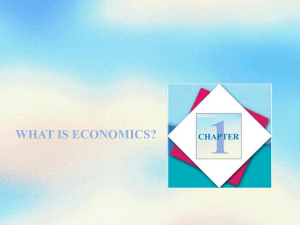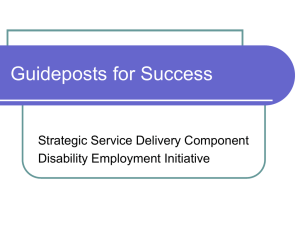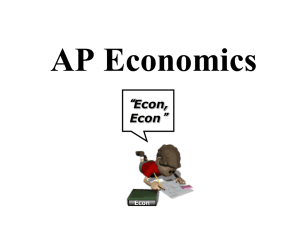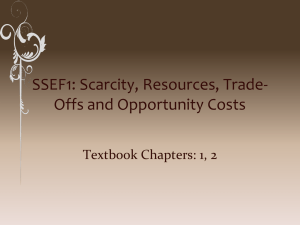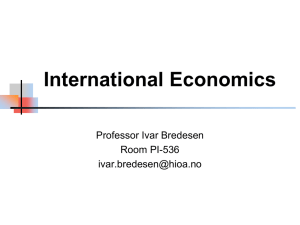A Ch 1 - Constraints, Guideposts (new window)
advertisement
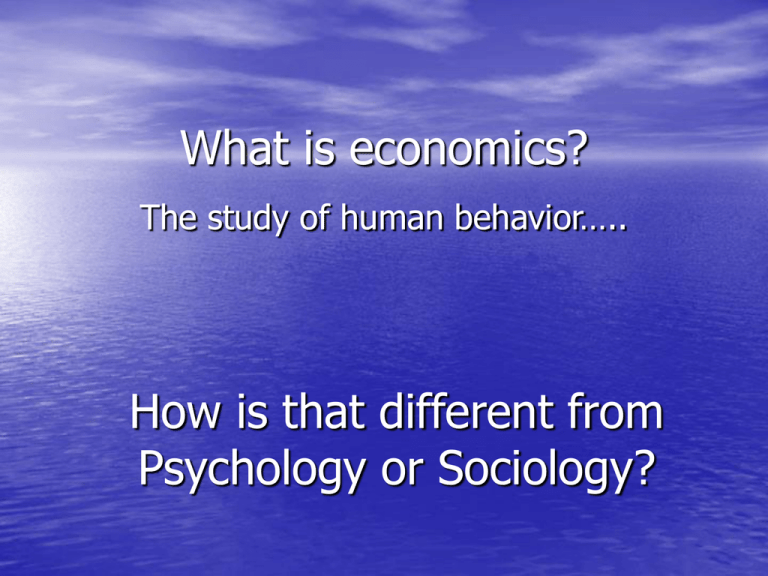
What is economics? The study of human behavior….. How is that different from Psychology or Sociology? How is that different from Psychology or Sociology? Economics…the study of human behavior and the choices that we make. Sociology…the study of human behavior when there are no choices to make…. What is economics? The study of human behavior….. ….in the presence of constraints. What constrains us? Constraints: • Society’s norms • Money • Parents…. • Time Why do we have constraints? • Scarcity — not enough of a good, freely in nature, as we would like. Where do constraints come from? Needs Desires-Unlimited Resources--LIMITED Resources: • Anything used to produce other goods and services…. – Human—knowledge, experience, talent – Physical—tools, machinery, factories – Natural—iron ore, oceans, rivers, land Class Work: 1.1 • Are scarcity and poverty the same thing? Explain using the terms objective or subjective OR positive or normative, your choice. Scarcity v. Poverty • Positive v. Normative Economics – Positive—fact, can be tested – Normative—opinion, value judgment • Objective v. Subjective Economics – Objective—fact, can be tested – Subjective—opinion, value judgment Scarcity necessitates: • Rationing—allocating a scarce resource among those who want it – Types of rationing: • First come, first served--inefficient • Subjective (prettiest, tallest, shortest) -- • arbitrary PRICE!!! -- efficient, non-arbitrary!! • Competition — • By price—promotes income generation • Makes us better off…better, cheaper, faster Thus: Scarcity ≠ Poverty • Scarcity—objective definition • Poverty—subjective definition; arbitrary income amount • Is life better today than 100 years ago? John Stossel: Report -- is life getting worse? So, are we better off or worse off now than 50 to 100 years ago? By all OBJECTIVE standards, we are better off. So, are we better off or worse off? If you were born in: 1900-1920 1995-1998 Life Expectancy (in years) Infant mortality (deaths per 1000 live births) Per Capita GDP (1998 dollars) High School Completion (% of 47 100 $4,800 22 77 7 $31,500 88 Computer Speed 0.02 700 adults) (computations / sec) (1976) Unemployment Rate ? ? Inflation ? ? (2000+ today) Conclusion: • We are SO fortunate…. – This country and this time of our lives The Economic Way of Thinking (8 Guideposts to Economic Thinking) 1. There is ALWAYS a tradeoff: – We call that tradeoff our Opportunity Cost • the highest valued option given up when you choose one thing over another – Spouse – Lunch – Coming to class The Economic Way of Thinking (8 Guideposts to Economic Thinking) 2. Individuals choose purposefully, therefore economically… • If you have 3 choices, which do you choose? How to you prioritize them? •Highest utility, lowest cost •Most BANG for our Buck! The Economic Way of Thinking (8 Guideposts to Economic Thinking) 3. Incentives matter: do I want you to come to class? How do you know? Parking in handicapped spaces…how do you know? The Economic Way of Thinking (8 Guideposts to Economic Thinking) 4. Economic thinking is marginal thinking People make decisions at the margin. “My poor mother….she had to choose between eating and buying her prescription drugs last month!!” Lloyd Benson, running for VP of US Fundamental lack of understanding of the difference between total costs and benefits vs. marginal costs and benefits. The Economic Way of Thinking (8 Guideposts to Economic Thinking) 5. Information is a costly good. Rational Ignorance — remaining ignorant about something where the cost of obtaining the knowledge is greater than the benefit of learning it. The Economic Way of Thinking (8 Guideposts to Economic Thinking) • Remember the secondary effects— – AFDC payments that increased the divorce rate – Rent controls that destroy the inner city – Increases in the money supply that give people more income but eventually result in higher inflation The Economic Way of Thinking (8 Guideposts to Economic Thinking) • The value of a good or service is subjective – What is something worth? Whatever someone is willing to pay for it. – You may value green space more than a paved parking lot or you may value the parking lot more. – Economics tries not to make value judgments but instead looks at the measurable effects of, say, paving a parking lot. The Economic Way of Thinking (8 Guideposts to Economic Thinking) • The test of a theory is its ability to predict. Is economics a science? Can you form hypotheses, test them and draw conclusions? Yes, then economic thinking is scientific thinking. Pitfalls to avoid in economic thinking • Violating the ceteris paribus condition -- ceteris paribus — all else equal, other things constant -- if you forget this, it can lead to erroneous conclusions. -- You know that income is growing in the US but you notice that people are buying fewer radios. How can that be? MP3 players -- If 2 things are changing at once, predicting is much more difficult. Pitfalls to avoid in economic thinking • Just because something seems like a good idea doesn’t mean it is (good intentions do not guarantee good outcomes). -- rent controls -- FAA regs to require all children to wear safety belts (requiring their own seat) Pitfalls to avoid in economic thinking • Association is not causation – --every time it rains I see folks with umbrellas. Conclusion: umbrellas cause rain. Pitfalls to avoid in economic thinking • The Fallacy of Composition – just because something is good for one, does not make it good for all – One farmer has a bumper crop and his income rises. ALL farmers have a bumper crop…. – I leave work early to beat the rush. EVERYONE leaves work early….. Class Work: 1.2 Give me another example of violating the “association is not causation” pitfall.
